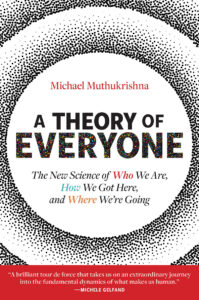

BOOK REVIEW
A Theory of Everyone: The New Science of Who We Are, How We Got Here, and Where We’re Going
![]()
Michael Muthukrishna, MIT Press, 2023
Reviewed by Giuseppe Guaiana, MD, PhD
 In A Theory of Everyone, Michael Muthukrishna presents an ambitious, interdisciplinary exploration of human evolution and societal development. By unifying insights from psychology, biology, economics, and anthropology, he provides a framework to explain how human societies progress. The book’s core themes — energy, innovation, cooperation, and evolution — offer valuable lessons for medical leadership, providing a fresh perspective on managing health care systems and fostering collaboration.
In A Theory of Everyone, Michael Muthukrishna presents an ambitious, interdisciplinary exploration of human evolution and societal development. By unifying insights from psychology, biology, economics, and anthropology, he provides a framework to explain how human societies progress. The book’s core themes — energy, innovation, cooperation, and evolution — offer valuable lessons for medical leadership, providing a fresh perspective on managing health care systems and fostering collaboration.
Muthukrishna, a professor at the London School of Economics, specializes in economic psychology and cultural evolution. His research focuses on how human behaviour and culture shape institutions, drive innovation, and influence societal outcomes. These insights are especially relevant for health care leaders, where success relies on navigating human dynamics and fostering collaboration in complex organizations. His interdisciplinary approach offers a useful framework for understanding the systemic challenges faced by medical leaders today.
At the heart of Muthukrishna’s argument are the “four laws of life” — energy, innovation, cooperation, and evolution — which, he argues, govern all forms of life and human societies. Energy, the foundation, enables movement and survival. Innovation allows societies to harness energy more efficiently, while cooperation enables groups to thrive by working together. Finally, evolution ensures that societies and institutions adapt to new challenges over time. For medical leaders, understanding these principles can help foster a culture of collaboration, innovation, and adaptability, crucial elements for ongoing improvement in health care delivery.
One of Muthukrishna’s key concepts is the “collective brain,” a metaphor for how innovation arises from social cooperation and shared knowledge. According to Muthukrishna, progress is rarely the result of isolated individual effort. Instead, it emerges when people collaborate and build on each other’s ideas. This view resonates with the structure of modern health care, where breakthroughs in treatment and operational efficiency often come from interdisciplinary collaboration. Leaders in health care must recognize the power of collective knowledge and foster environments that encourage teamwork across specialties and institutions.
Muthukrishna also emphasizes the importance of institutional evolution. He critiques rigid models of governance that fail to adapt to changing circumstances, advocating instead flexible, data-driven approaches. In health care, where innovations in telemedicine, artificial intelligence, and digital health are rapidly transforming the landscape, leaders must remain agile. The ability to adapt organizational strategies in response to emerging technologies, patient expectations, and new ethical considerations is crucial to maintaining quality of care. Muthukrishna’s insights on institutional flexibility offer valuable guidance for medical leaders who must balance innovation with operational efficiency.
An important lesson Muthukrishna draws from history is how energy breakthroughs create periods of abundance, followed by new challenges. This analogy applies well to health care, where such technological advancements as genomics and personalized medicine offer tremendous potential, but also raise new questions about implementation, equity, and ethics. Muthukrishna encourages leaders to anticipate and manage these challenges proactively, rather than reacting to them as they arise. In doing so, leaders can better integrate new technologies in ways that benefit both patients and institutions.
Beyond energy and innovation, Muthukrishna’s emphasis on cooperation and cultural evolution provides key insights for health care leadership. The book highlights how societies evolve through collaboration, learning from others both within and across groups. In health care, this concept translates into the need for diverse teams to work together to tackle complex challenges. By fostering a culture of cooperation, leaders can create environments where innovation thrives and problems are addressed more effectively. The integration of diverse perspectives — from physicians and nurses to administrators and technologists — is critical to improving patient care and health care outcomes.
One of the central takeaways for medical leaders is the need to broaden their focus beyond the narrow confines of their discipline. Muthukrishna’s interdisciplinary approach illustrates the benefits of integrating knowledge from multiple fields to better understand complex systems. In health care, this means looking beyond the immediate clinical challenges to consider how societal, economic, and technological factors interact with patient care. Leaders who can adopt this broader perspective will be better equipped to drive innovation, foster collaboration, and navigate the complexities of modern health care.
While A Theory of Everyone offers a sweeping view of societal development, some sections of the book may feel abstract to health care leaders seeking immediate, practical solutions. For instance, Muthukrishna’s discussions on global governance and energy systems, while intellectually stimulating, may seem distant from the day-to-day concerns of medical leadership. However, the book’s central message — that the success of human societies depends on understanding and applying the dynamics of cooperation, innovation, and evolution — is directly applicable to those leading health care organizations.
In sum, A Theory of Everyone is a thought-provoking and intellectually ambitious book that provides medical leaders with a new framework for thinking about leadership, innovation, and cooperation. Muthukrishna’s interdisciplinary insights equip health care leaders with tools to better navigate the challenges of the 21st century, fostering environments that promote collaboration, innovation, and long-term success. For those willing to adopt a broader, systems-level approach to leadership, the book offers a valuable roadmap for achieving meaningful progress in health care.
Author
Giuseppe Guaiana, MD, PhD, FRCPC, CCPE, is an associate professor in the Department of Psychiatry at Western University and chief of psychiatry at Saint Thomas Elgin General Hospital, ON as well as Director, Extended Campus Program, and Clinical Director, North of Superior Program.
Correspondence to: gguaiana@stegh.on.ca